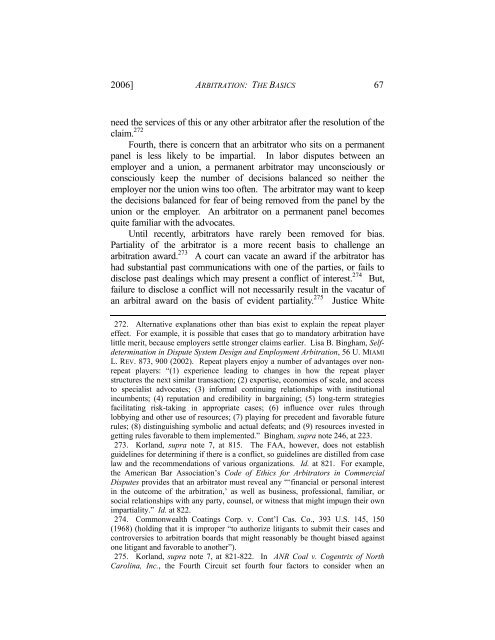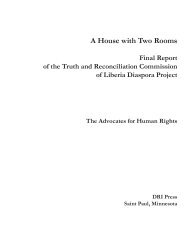2006/Vol. 5 No.1 - Hamline Law - Hamline University
2006/Vol. 5 No.1 - Hamline Law - Hamline University
2006/Vol. 5 No.1 - Hamline Law - Hamline University
You also want an ePaper? Increase the reach of your titles
YUMPU automatically turns print PDFs into web optimized ePapers that Google loves.
<strong>2006</strong>] ARBITRATION: THE BASICS 67<br />
need the services of this or any other arbitrator after the resolution of the<br />
claim. 272<br />
Fourth, there is concern that an arbitrator who sits on a permanent<br />
panel is less likely to be impartial. In labor disputes between an<br />
employer and a union, a permanent arbitrator may unconsciously or<br />
consciously keep the number of decisions balanced so neither the<br />
employer nor the union wins too often. The arbitrator may want to keep<br />
the decisions balanced for fear of being removed from the panel by the<br />
union or the employer. An arbitrator on a permanent panel becomes<br />
quite familiar with the advocates.<br />
Until recently, arbitrators have rarely been removed for bias.<br />
Partiality of the arbitrator is a more recent basis to challenge an<br />
arbitration award. 273 A court can vacate an award if the arbitrator has<br />
had substantial past communications with one of the parties, or fails to<br />
disclose past dealings which may present a conflict of interest. 274 But,<br />
failure to disclose a conflict will not necessarily result in the vacatur of<br />
an arbitral award on the basis of evident partiality. 275 Justice White<br />
272. Alternative explanations other than bias exist to explain the repeat player<br />
effect. For example, it is possible that cases that go to mandatory arbitration have<br />
little merit, because employers settle stronger claims earlier. Lisa B. Bingham, Selfdetermination<br />
in Dispute System Design and Employment Arbitration, 56 U. MIAMI<br />
L. REV. 873, 900 (2002). Repeat players enjoy a number of advantages over nonrepeat<br />
players: “(1) experience leading to changes in how the repeat player<br />
structures the next similar transaction; (2) expertise, economies of scale, and access<br />
to specialist advocates; (3) informal continuing relationships with institutional<br />
incumbents; (4) reputation and credibility in bargaining; (5) long-term strategies<br />
facilitating risk-taking in appropriate cases; (6) influence over rules through<br />
lobbying and other use of resources; (7) playing for precedent and favorable future<br />
rules; (8) distinguishing symbolic and actual defeats; and (9) resources invested in<br />
getting rules favorable to them implemented.” Bingham, supra note 246, at 223.<br />
273. Korland, supra note 7, at 815. The FAA, however, does not establish<br />
guidelines for determining if there is a conflict, so guidelines are distilled from case<br />
law and the recommendations of various organizations. Id. at 821. For example,<br />
the American Bar Association’s Code of Ethics for Arbitrators in Commercial<br />
Disputes provides that an arbitrator must reveal any “‘financial or personal interest<br />
in the outcome of the arbitration,’ as well as business, professional, familiar, or<br />
social relationships with any party, counsel, or witness that might impugn their own<br />
impartiality.” Id. at 822.<br />
274. Commonwealth Coatings Corp. v. Cont’l Cas. Co., 393 U.S. 145, 150<br />
(1968) (holding that it is improper “to authorize litigants to submit their cases and<br />
controversies to arbitration boards that might reasonably be thought biased against<br />
one litigant and favorable to another”).<br />
275. Korland, supra note 7, at 821-822. In ANR Coal v. Cogentrix of North<br />
Carolina, Inc., the Fourth Circuit set fourth four factors to consider when an
















